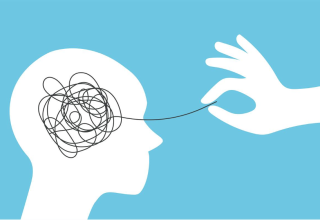It used to be that opening up about your health could get you committed to a terrifying institution. That, or they might electrocute you for a while, or cut out a small chunk of your brain — just for funsies. If you were a woman, you could sometimes get a diagnosis for something called “hysteria.” Symptoms included “excessive emotion,” and treatments supposedly consisted of marriage, doctor-delivered orgasm, and… leeches.
Back then, you had to stay quiet if you didn’t want to be blood-let or sent in for a medical masturbation session. But now, influencers, celebrities, and even politicians are starting to talk online about their struggles. The cultural impact of this change has been widely felt, rippling through everything from treatment methods to language. Here are just some of the ways the internet is changing the way people talk — and think — about mental health.
1. Passing Along Resources
One of the most important changes the internet has brought about is access to different forms of treatment and mental healthcare. That’s because it’s become so much more socially acceptable to talk and swap helpful sources of information. More bloggers, creators, and online publications are discussing struggles and linking to important content. That means people who need it are more likely to find, be sent, or stumble upon the right resources.
Consider a teenager in the ‘90s or earlier who might’ve been struggling with depression, anxiety, or bipolar disorder while not knowing who to speak to. In order to get help, they’d first have to recognize and acknowledge the issue themselves. Then, they’d have to work up the nerve to ask their parents, or maybe bring it up with their doctor during an annual physical. Now, that same person might go on TikTok, and get a mental health rehab recommendation, then schedule an intake online.
2. Communal Conversation
Another advantage of social media is that, beyond connecting people with resources, it opens up a forum for conversation. People from all over the world can go online and share their questions, concerns, experiences, symptoms, and more. Strangers can share advice, support, and stories and find relief from feelings of loneliness. There’s much less pressure to hide or suffer in silence, when everyone out there is talking.
Entire friendships have formed on the internet from people connecting through a TikTok, Reel, or Reddit thread. The anonymity of the online experience — especially in text-based formats — makes it easier to really be heard. Speaking to strangers has made it easier for people to share the full depths of their experiences without shame. As long as it’s done safely (in addition to therapy and treatment), this can be a really healing experience for some.
3. De-Stigmatization
As more and more people share their stories, it becomes increasingly acceptable to have a mental health issue. People who might’ve once been shamed, shunned, or committed can now have successful careers, relationships, and community roles. Just a few years ago, a person might’ve had to lie to their boss about taking anxiety medication. But now, with the influence of the internet, even high-power CEOs are talking about the side effects of their antipsychotics.
There’s still a long way to go, of course, in terms of truly destigmatizing mental illness. In certain roles, it’s still not totally permissible to have a mental health issue. Your symptoms still might get you kicked out of the military or passed over for an important promotion. The Americans with Disabilities Act prevents discrimination on the basis of mental health. But in practice, there are still some places where you can’t afford to talk about your diagnosis.
4. A Whole New Language
De-stigmatization of mental health talk has led to an interesting, unexpected change. The way people talk about mental health isn’t just more open, it’s far more creative. Gen Z and other folks online are using colorful new slang terms to talk about their mental health. Terms include “neurospicy” to describe neurodivergence, “menty b” for a mental breakdown, and “grippy sock vacation” for psychiatric hospitalization.
On the one hand, making light of your “stresso depresso” moments could potentially make it easier to mask true feelings. But that’s probably outweighed by the impact that this language has on connecting people with care. Someone who’s struggling to speak freely about their symptoms might still toss around these words as a cry for help. That makes the odds a lot higher that a friend, family member, or teacher will notice and direct them to therapy or treatment.
5. Someone New to Talk to
Another way the internet is changing things is by creating new, non-human people to talk to. Chatbot-based mental health apps have been shown to reduce the severity of mental health concerns in some cases. Sure, a real live (or Zoom) therapy session with an actual human is significantly more beneficial. But learning to talk to robots may show some important benefits in certain places or for people that don’t have the option.
The dark side is that these chatbots can’t always effectively gauge how to best respond to every statement. And they don’t always notice if the person they’re talking to is trying to explain that they’re in crisis. Some people may also turn to large language models like ChatGPT and Genesis for mental health support. But these chatbots aren’t designed to offer medical resources or advice, and may inadvertently say things that could cause harm.
Talk It Out
The impact of the internet on mental health-speak is clear. On the one hand, things are getting weirder and sometimes leaning toward the TMI. On the other hand, more people are disclosing symptoms, getting help, and establishing strong support networks. The bottom line? Lives are being saved, because finding the right resources is so much simpler than previous generations could ever have imagined.
Still, if you are suffering from mental health symptoms, including sadness, fatigue, and mood changes, don’t rely on just any old internet advice. Make sure you connect with reputable professionals, who can help you get the right diagnosis and treatment. It may take some time to find the right practitioners and get the compassionate care you need. But at least you can rest easy, knowing your health (probably) isn’t in the hands — or jaws — of a blood-sucking worm.













